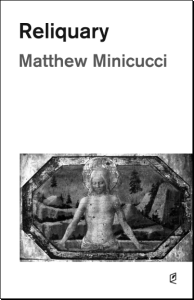He lays prone on the smooth base,
with left arm pulled back across his body.
Take this arm, he says,
this hand.
This plaster cracked down the knucklebone.
It’s only symbol,
symbolon,
that small thing which has been wrenched apart
we seek to put back together.
Desperately.
Such disparity in our desperations.
If I were to compare this broken hand to yours
if you signed my cast in blood,
or the wine I stole from the tabernacle,
would I be healed?
It is in this way we are asked to pretend
to take the body into our mouth
but not to swallow;
to taste the blood and believe.
But I don’t believe.
This wine-dark liquid has no hand
on the treacle and spit that filled my mouth after a fight
how it tasted like the snipped tin
Chris dared me to eat off the floor of my grandfather’s shop.
Blood gathers these broken pieces, like sawdust
spread on bile, and settles them
into the tender and cursory holes left behind.
It’s not that I don’t understand how
different the sound is when the wound is ripped instead of cut;
or how the bruise turns
from black to red when it breathes.
It’s that you fill this cup again
and again from some glass carafe
and forget
that no one could ever believe in a blood that tastes so sweet.
–Matthew MiniCucci,
Reliquary, Accents Publishing
- "Figure 6: Veronica Wipes the Face of Jesus"
- "Figure 5: Simon of Cyrene"
- "Figure 4: Jesus Meets His Mother"
- "Figure 3: Jesus Falls (1)"
- “Figure 2: Jesus Takes Up His Cross"
- “Figure 1: Jesus is Condemned to Death”
 Matthew Minicucci is a graduate of the MFA program at the University of Illinois in Urbana, Champaign. His work has appeared in or is forthcoming from numerous journals, including: The Gettysburg Review, The Southern Review, The Literary Review, Mid-American Review, Hayden’s Ferry Review, Cream City Review, and Crazyhorse, among others. He has also been featured on Verse Daily. He currently teaches writing at Millikin University in Decatur, Illinois.
Matthew Minicucci is a graduate of the MFA program at the University of Illinois in Urbana, Champaign. His work has appeared in or is forthcoming from numerous journals, including: The Gettysburg Review, The Southern Review, The Literary Review, Mid-American Review, Hayden’s Ferry Review, Cream City Review, and Crazyhorse, among others. He has also been featured on Verse Daily. He currently teaches writing at Millikin University in Decatur, Illinois.
